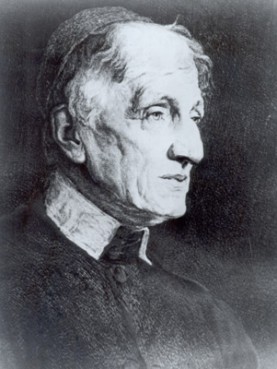
(RNS) Cardinal John Henry Newman, England’s most famous Catholic convert, is now one step away from sainthood after Pope Benedict XVI beatified him on Sunday (Sept. 19, 2010). Religion News Service file photo.
BIRMINGHAM, England (RNS) Pope Benedict XVI put one of the church’s most celebrated converts one step closer to sainthood on Sunday (Sept. 19) and reiterated his support for a plan to make it easier for Britain’s Anglicans to join the Catholic Church.
Wrapping up his four-day state visit to Britain, the pope ended the trip much the same way he had spent it _ tackling head-on controversies over Europe’s secular drift and voicing regret for the church’s mishandling of the clergy sexual abuse scandal.
The pope flew by helicopter from London to meet as many as 70,000 pilgrims who had been waiting for hours in the rain in Birmingham’s Cofton Park, where Benedict beatified the late Cardinal John Henry Newman.
The sun broke through just as Benedict arrived to declare Newman “blessed,” placing the theologian and convert from Anglicanism one step away from sainthood.
Jack Sullivan, a Catholic deacon from Boston who the Vatican said was healed from debilitating back pain after praying for Newman’s intercession, read the Gospel during the beatification Mass. A second miracle will be needed to make Newman a saint.
Benedict praised Newman’s educational philosophy, which he said continues to inspire Catholic schools and colleges. Throughout his visit here, Benedict has stressed the church’s contributions to wider society through education and charitable works.
Benedict later prayed at Newman’s tomb at the Birmingham Oratory, where Newman lived out his final years. Vatican officials have chosen Oct. 9 as Newman’s feast day _ the anniversary of his joining the Catholic Church _ not the date of his death, Aug. 11, as is tradition.
The German-born pope also acknowledged the 70th anniversary of the Battle of Britain, when the Royal Air Force fended off an invasion by Nazi Germany, and expressed his “shame and horror” at the 1940 bombardment of nearby Coventry.
Lingering memories of the German assault were a tricky issue for Benedict, who was conscripted into the Hitler Youth as a teenager, and the Vatican, which has deliberately downplayed Benedict’s wartime involvement.
“For me as one who lived and suffered through the dark days of the Nazi regime in Germany, it is deeply moving to be here with you on this occasion, and to recall how many of your fellow citizens sacrificed their lives, courageously resisting the forces of that evil ideology,” Benedict said.
Many in the crowd seemed taken with the pope during his first visit to his British flock, with one sign proclaiming a decidedly British form of affection: “We Love Papa More Than Beans on Toast.”
“I really wanted to be here and see the pope and I’m glad I did,” said Lidia Carnevale-Scott, 42, a nursery assistant from nearby Sheldon. “He seems a lot warmer than I thought he would be.”
Vatican officials were more than satisfied with the response Benedict received, despite a sizable protest on Saturday in downtown London. Officials estimated more than half a million people saw Benedict during his stops or parades through Scotland, London and Birmingham.
“This has surpassed all our expectations. The atmosphere at all the events has been fantastic and the pope has been struck by the scenes of joy,” one Vatican official said.
After the open-air Mass, Benedict met with the Catholic bishops of England, Scotland and Wales, warning of the “urgent need to proclaim the Gospel afresh in a highly secularized environment.”
A day after voicing his “shame and humiliation” over the abuse scandal, Benedict noted the “often inadequate ways” the church had responded, and urged the British bishops to “share the lessons you have learned with the wider community.”
“What better way could there be of making reparation for these sins than by reaching out, in a humble spirit of compassion, towards children who continue to suffer abuse elsewhere?” the pope asked.
Addressing perhaps the most sensitive issue during his visit to Britain, Benedict urged the bishops to be “generous” in implementing a plan that allows Anglican converts to retain many of their traditional prayers and hymns in specially designed Catholic dioceses.
The scheme has strained relations with the Church of England, which broke from Rome nearly 500 years ago over issues of papal authority.
Benedict said the dioceses “should be seen as a prophetic gesture” to help heal the breach between the two churches, and eventually lead to the “ultimate goal of all ecumenical activity: the restoration of full ecclesial communion.”




